一般现在时详解+例句
一般现在时简单例句

一般现在时简单例句
1. 我妈做菜时盐就像不要钱似的,一般现在时她做菜都超咸。
2. 那只猫就像个小懒虫,一般现在时整天都在睡觉。
3. 小李说话像开机关枪一样,一般现在时语速快得惊人。
4. 我爸一般现在时看新闻就像着了魔,雷打不动。
5. 小明玩游戏像个拼命三郎,一般现在时只要有空就玩。
6. 我的邻居唱歌像拉锯一样,一般现在时每次唱歌都能把人吓跑。
7. 那个小孩哭起来像个小喇叭,一般现在时稍不顺心就嚎啕大哭。
8. 老王吹牛像吹气球,一般现在时动不动就把事情吹上天。
9. 这台老电脑一般现在时运行起来像蜗牛在爬,慢得要死。
10. 我奶奶唠叨起来像个复读机,一般现在时翻来覆去就那几句话。
11. 那只狗一般现在时看到骨头就像看到了金山银山,眼睛放光。
12. 我弟弟笑起来像个小弥勒佛,一般现在时成天乐呵呵的。
13. 我们老板发火像火山爆发,一般现在时员工犯错就炸。
14. 那个大妈砍价像个武林高手,一般现在时能把价格砍到骨折。
15. 小周跑步像一阵风,一般现在时在操场总是跑得飞快。
16. 我这记性像个筛子,一般现在时刚说的事转头就忘。
17. 这公交车像个沙丁鱼罐头,一般现在时每次人都超多。
18. 她化妆像易容术一样,一般现在时每次化完妆都像变了个人。
一般现在时详解+例句

一、单项选择一般现在时
1.With such a tight schedule, everyone will have to go all out if they _____________ the task.
A.have completed B.would complete
C.will complete D.are to complete
A.has doneB.is doingC.doesD.had done
【答案】C
【解析】
考查时态。在if引导的条件状语从句中,当主句中含有情态动词时,从句用一般现在时。注意此处主句中的could表示不太肯定的语气,不是一般过去时的标志。
8.In our hometown, about 1,500 meters east of my house,_______ an old temple_______ back to the 17thcentury.
考点:考查祈使句
5.The Dragon Boat Festival ________ the beginning of the hottest season of the year.
A.is markingB.marksC.will markD.marked
【答案】B
【解析】
试题分析:考查时态。一般现在时表示经常性习惯性的行为。本句中使用一般现在时端午节标志着一年中最热的季节的开始。故B正确。
A.datedB.was dated
C.datesD.is dating
【答案】C
【解析】
试题分析:考查动词短语和时态。短语date back to追溯到....;从....开始有;该句型没有被动语态,也没有进行时。通常都使用一般现在时表示从现在时间某一事物能够追溯到的时期。故C项正确。
时态一般现在时的用法
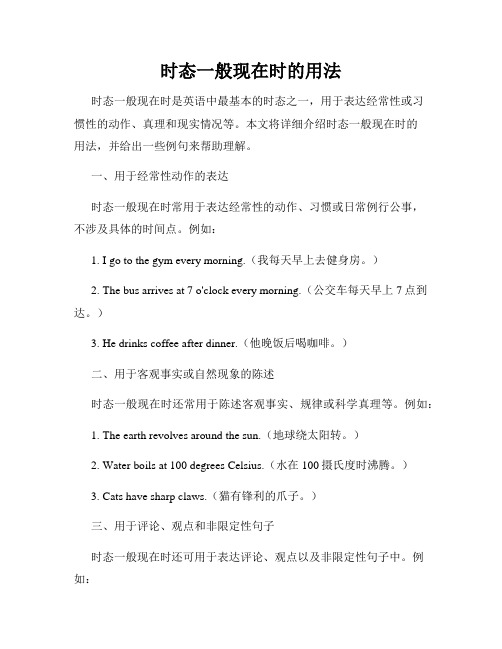
时态一般现在时的用法时态一般现在时是英语中最基本的时态之一,用于表达经常性或习惯性的动作、真理和现实情况等。
本文将详细介绍时态一般现在时的用法,并给出一些例句来帮助理解。
一、用于经常性动作的表达时态一般现在时常用于表达经常性的动作、习惯或日常例行公事,不涉及具体的时间点。
例如:1. I go to the gym every morning.(我每天早上去健身房。
)2. The bus arrives at 7 o'clock every morning.(公交车每天早上7点到达。
)3. He drinks coffee after dinner.(他晚饭后喝咖啡。
)二、用于客观事实或自然现象的陈述时态一般现在时还常用于陈述客观事实、规律或科学真理等。
例如:1. The earth revolves around the sun.(地球绕太阳转。
)2. Water boils at 100 degrees Celsius.(水在100摄氏度时沸腾。
)3. Cats have sharp claws.(猫有锋利的爪子。
)三、用于评论、观点和非限定性句子时态一般现在时还可用于表达评论、观点以及非限定性句子中。
例如:1. The movie is interesting and the actors perform well.(这部电影很有趣,演员表现很好。
)2. I believe that exercise is important for a healthy lifestyle.(我相信锻炼对健康的生活方式很重要。
)3. It is said that he is a talented musician.(据说他是位才华横溢的音乐家。
)四、表示日程安排和时间表时态一般现在时还用于表示日程安排和时间表中的事件。
例如:1. The meeting starts at 9 o'clock tomorrow.(明天会议9点开始。
英语主谓宾例句八种时态的例子
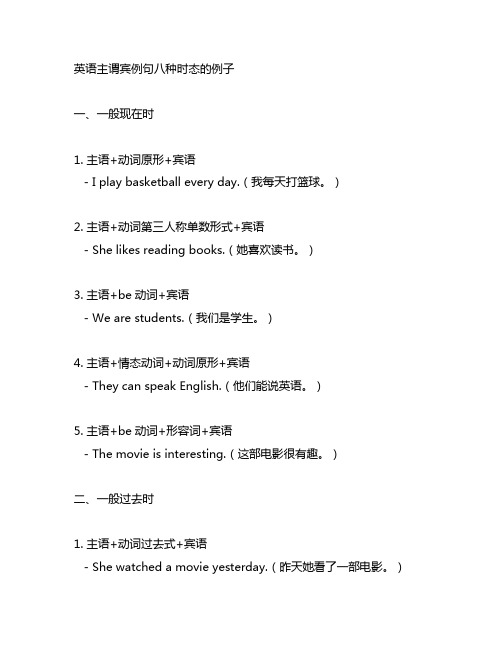
英语主谓宾例句八种时态的例子一、一般现在时1. 主语+动词原形+宾语- I play basketball every day.(我每天打篮球。
)2. 主语+动词第三人称单数形式+宾语- She likes reading books.(她喜欢读书。
)3. 主语+be动词+宾语- We are students.(我们是学生。
)4. 主语+情态动词+动词原形+宾语- They can speak English.(他们能说英语。
)5. 主语+be动词+形容词+宾语- The movie is interesting.(这部电影很有趣。
)二、一般过去时1. 主语+动词过去式+宾语- She watched a movie yesterday.(昨天她看了一部电影。
)2. 主语+be动词过去式+宾语- They were happy last night.(他们昨晚很开心。
)三、一般将来时1. 主语+will+动词原形+宾语- We will go to the park tomorrow.(我们明天会去公园。
)2. 主语+be going to+动词原形+宾语- She is going to visit her grandparents next week.(下周她会去拜访奶奶和爷爷。
)四、现在进行时1. 主语+be动词+动词-ing形式+宾语- They are studying English now.(他们现在正在学习英语。
)2. 主语+be动词+动词-ing形式+时间状语+宾语- He is watching TV at the moment.(他现在正在看电视。
)五、过去进行时1. 主语+be动词过去式+动词-ing形式+宾语- I was reading a book at this time yesterday.(昨天这个时候我正在读一本书。
)六、将来进行时1. 主语+will+be动词+动词-ing形式+宾语- We will be w本人ting for you at the 本人rport tomorrow.(我们明天会在机场等你。
【精品】一般现在时详解+例句
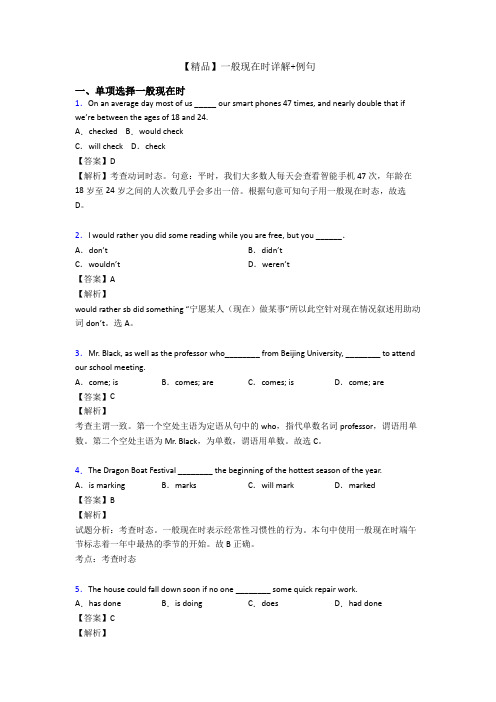
C.remains D.had remained.
【答案】C
【解析】考查动词时态。句意:我知道白日梦有益于发明,但事实是它没有确凿的证据。根据所给动词是一般现在时和句意可知此处也用一般现在时,故选C.
14.Look at the pride on Tom’s face. He ________ to have been praised by the manager just now.
考点:考查谓语动词
17.Usually Beijing Roast Duck _____ together with special pancakes, green onions and sweet sauce.
A.was served B.will serve
C.is served D.served
A.don’tB.didn’t
C.wouldn’tD.weren’t
【答案】A
【解析】
would rather sb did something “宁愿某人(现在)做某事”所以此空针对现在情况叙述用助动词don’t。选A。
3.Mr. Black, as well as the professor who________ from Beijing University, ________ to attend our school meeting.
A.seemedB.seemsC.had seemedD.is seeming
【答案】B
【解析】
【详解】
考查时态。句意:看汤姆脸上骄傲的表情,他似乎已经被经理刚才表扬过。根据第一句中Look at可知,表示现在的状态,要用现在时态,故选B。
【英语】一般现在时详解+例句
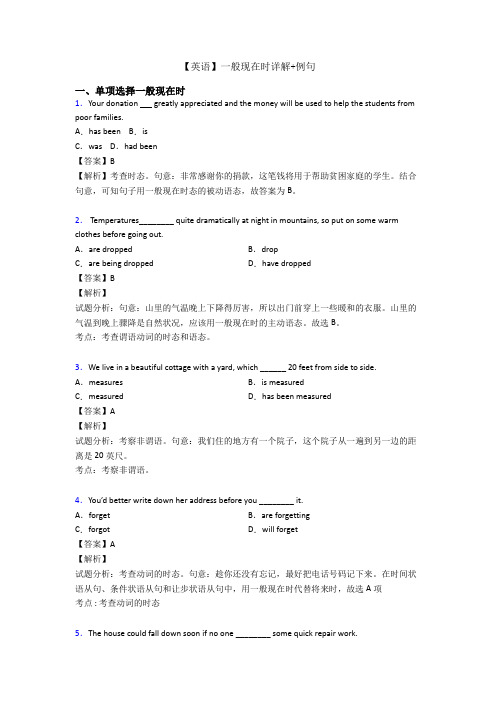
C.forgotD.will forget
【答案】A
【解析】
试题分析:考查动词的时态。句意:趁你还没有忘记,最好把电话号码记下来。在时间状语从句、条件状语从句和让步状语从句中,用一般现在时代替将来时,故选A项
考点:考查动词的时态
5.The house could fall down soon if no one ________ some quick repair work.
A.didn’t havn’t haveD.hadn’t had
【答案】B
【解析】
试题分析:考查动词时态及句意理解。句意:因为镇上没有好的餐馆,我们只好在家里用当地食品招待外国客人。虽然句中用yesterday作为时间状语,但是没有好餐馆是现在这一段时间的一个事实,所以应该采用一般现在时态,故B正确。
C.will check D.check
【答案】D
【解析】考查动词时态。句意:平时,我们大多数人每天会查看智能手机47次,年龄在18岁至24岁之间的人次数几乎会多出一倍。根据句意可知句子用一般现在时态,故选D。
16.-Hi, Lucy! What's the schedule for tomorrow?
8.---The CDs by the star ______ well.
---That’s true. More than ten million copies have been sold out so far.
A.are soldB.sell
C.sellsD.is sold
【答案】B
【解析】
试题分析:句意:--这个明星的CD卖的好。--那是真的,十万多张唱片都被卖了。这里强调CD的特点是好卖,强调的是CD本身的属性,不是强调卖这个动作,用主动表示被动,选B。
一般现在时英语讲解
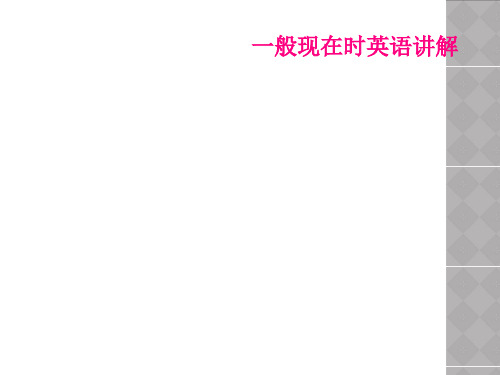
24. Li Xing goes home late on Friday afternoon . (对画线部分提问)
when does
Li Xing go home late ?
25. This girl is Joy Smith . (变为特殊疑问 句) who is this girl ?
26. The twins are eleven . (变为特殊疑问 句) how old are the twins ?
12. (not look) at your book !
13. you (can see)the bananas on the table ? 14. I need (buy ) some new clothes . 15. She likes (play) chess . 16. It’s time (play) games . 17. You must (be) a good student . 18. She must (sing) well . 19. He (have) an egg and a banana for breakfast . 20. Li Min (take) a shower after lunch .
e.g. Do you stay at home on Saturdays?
Do they have sports every day? ☺Does+主语(he/she/it)+动词原形+其他?
e.g. Does he stay at home on Saturdays?
特殊疑问句:疑问词+ do/does+主语+动词原形+其他?
9. Lily and Lucy are fifteen years old now . (对画线 部分提问)How old are Lily and Lucy ?
一般现在时的句子5个例句
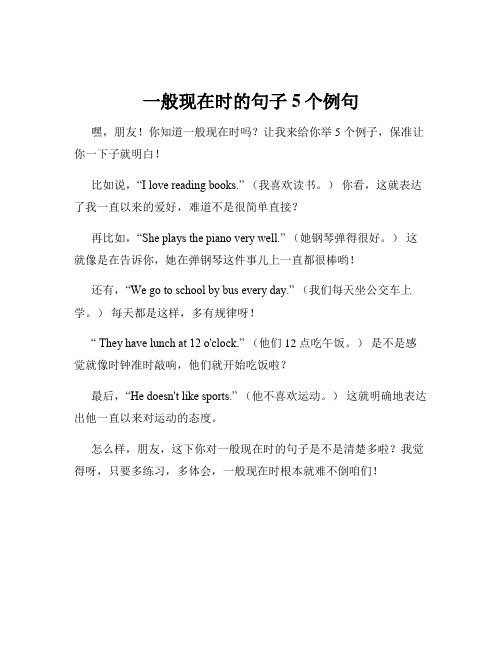
一般现在时的句子5个例句嘿,朋友!你知道一般现在时吗?让我来给你举 5 个例子,保准让你一下子就明白!
比如说,“I love reading books.” (我喜欢读书。
)你看,这就表达了我一直以来的爱好,难道不是很简单直接?
再比如,“She plays the piano very well.” (她钢琴弹得很好。
)这就像是在告诉你,她在弹钢琴这件事儿上一直都很棒哟!
还有,“We go to school by bus every day.” (我们每天坐公交车上学。
)每天都是这样,多有规律呀!
“ They have lunch at 12 o'clock.” (他们 12 点吃午饭。
)是不是感觉就像时钟准时敲响,他们就开始吃饭啦?
最后,“He doesn't like sports.” (他不喜欢运动。
)这就明确地表达出他一直以来对运动的态度。
怎么样,朋友,这下你对一般现在时的句子是不是清楚多啦?我觉得呀,只要多练习,多体会,一般现在时根本就难不倒咱们!。
一般现在时的句子

一般现在时的句子一般现在时是英语中最基本的时态之一,表示经常性或习惯性的动作或状态。
在构成上,一般现在时通常使用动词的原形,第三人称单数形式需在动词原形后加-s或-es。
除了表示经常性或习惯性的动作或状态外,一般现在时还可以表示客观真理、科学事实、演绎推理等。
下面将通过一些例句来说明一般现在时的用法。
1. He plays basketball every weekend.他每个周末都打篮球。
2. She teaches English at the local school.她在当地学校教英语。
3. The sun rises in the east.太阳从东方升起。
4. Water boils at 100 degrees Celsius.水在100摄氏度时沸腾。
5. Cats like to chase mice.猫喜欢追逐老鼠。
6. I work in an office.我在一家办公室工作。
7. They live in a big house.他们住在一所大房子里。
8. The earth revolves around the sun.地球围绕太阳公转。
9. We use computers for work and entertainment.我们用电脑工作和娱乐。
10. The company produces high-quality products.这家公司生产高质量的产品。
总结,一般现在时用于表示经常性或习惯性的动作或状态,客观真理、科学事实、演绎推理等。
在构成上,动词的原形后加-s或-es。
掌握一般现在时的用法对于学习英语是非常重要的,希望以上例句能够帮助大家更好地理解和掌握一般现在时的用法。
一般现在时结构与用法全面讲解(带例句)
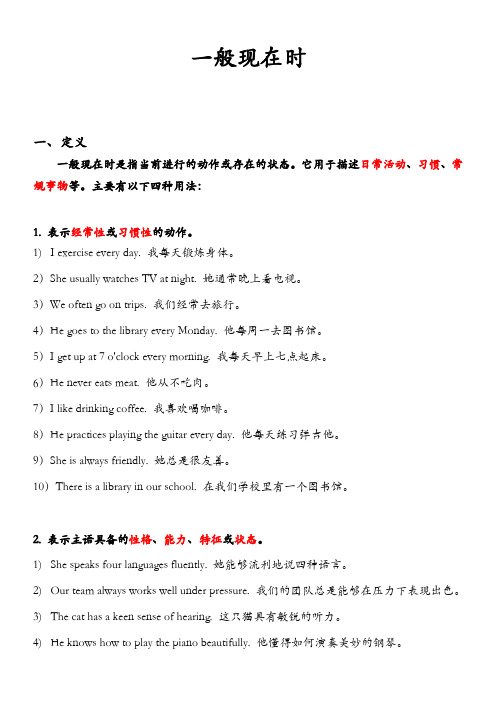
一般现在时一、定义一般现在时是指当前进行的动作或存在的状态。
它用于描述日常活动、习惯、常规事物等。
主要有以下四种用法:1.表示经常性或习惯性的动作。
1)I exercise every day.我每天锻炼身体。
2)She usually watches TV at night.她通常晚上看电视。
3)We often go on trips.我们经常去旅行。
4)He goes to the library every Monday.他每周一去图书馆。
5)I get up at7o'clock every morning.我每天早上七点起床。
6)He never eats meat.他从不吃肉。
7)I like drinking coffee.我喜欢喝咖啡。
8)He practices playing the guitar every day.他每天练习弹吉他。
9)She is always friendly.她总是很友善。
10)There is a library in our school.在我们学校里有一个图书馆。
2.表示主语具备的性格、能力、特征或状态。
1)She speaks four languages fluently.她能够流利地说四种语言。
2)Our team always works well under pressure.我们的团队总是能够在压力下表现出色。
3)The cat has a keen sense of hearing.这只猫具有敏锐的听力。
4)He knows how to play the piano beautifully.他懂得如何演奏美妙的钢琴。
5)Mary has a positive attitude towards challenges.玛丽对挑战持积极的态度。
6)He likes swimming.他喜欢游泳。
7)My grandmother always remembers everyone's birthdays.我奶奶总是记得每个人的生日。
【英语】一般现在时详解+例句

考点:考查动词短语
6.In our hometown, about 1,500 meters east of my house,_______ an old temple_______ back to the 17thcentury.
考点:考查固定搭配
17.With such a tight schedule, everyone will have to go all out if they _____________ the task.
A.have completed B.would complete
C.will complete D.are to complete
16.Theoretically, a good screwdriver should last a lifetime, but it rarely___________, usually because it is used at one time or another as ___________ some other tool.
7.I ______ for Shanghai this Saturday, so I want to know when the earliest plane ______.
A.leave; takes off B.am leaving; takes off
C.leave; is taking off D.am leaving; is taking off
A.came, have finishedB.comes, have finished
一般现在时详解+例句
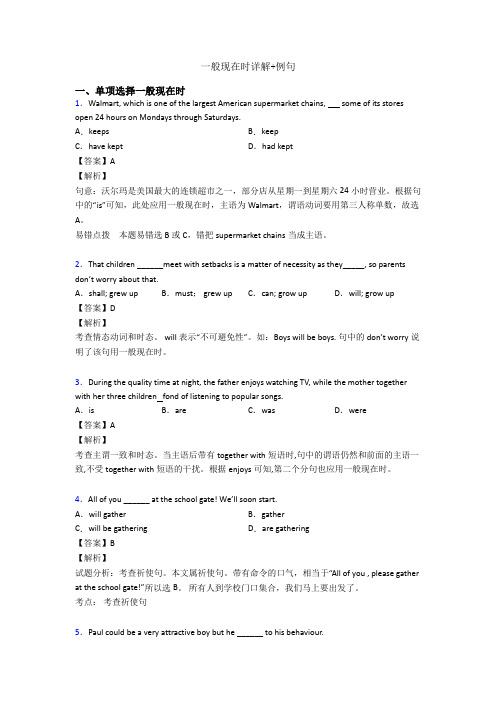
一般现在时详解+例句一、单项选择一般现在时1.Walmart, which is one of the largest American supermarket chains, some of its stores open 24 hours on Mondays through Saturdays.A.keeps B.keepC.have kept D.had kept【答案】A【解析】句意:沃尔玛是美国最大的连锁超市之一,部分店从星期一到星期六24小时营业。
根据句中的“is”可知,此处应用一般现在时,主语为Walmart,谓语动词要用第三人称单数,故选A。
易错点拨本题易错选B或C,错把supermarket chains当成主语。
2.That children ______meet with setbacks is a matter of necessity as they_____, so parents don’t worry about that.A.shall; grew up B.must; grew up C.can; grow up D.will; grow up【答案】D【解析】考查情态动词和时态。
will 表示“不可避免性”。
如:Boys will be boys. 句中的don’t worry说明了该句用一般现在时。
3.During the quality time at night, the father enjoys watching TV, while the mother together with her three children fond of listening to popular songs.A.is B.are C.was D.were【答案】A【解析】考查主谓一致和时态。
当主语后带有together with短语时,句中的谓语仍然和前面的主语一致,不受together with短语的干扰。
英语16种时态结构及例句

1. 一般现在时(do/does; is/am/are)①现在的动作、情况、状态和特征。
例:She is a teacher.她是一位老师②经常性、习惯性动作。
例:He always helps others.他总是帮助别人。
③客观事实和普遍真理。
如果前后文不是一般现在时,则无法保持主句、从句时态一致。
例:The earth moves round the sun.地球绕着太阳转。
④表示一个按规定、计划或安排要发生的动作。
例:The next train leaves at 3 o'clock this afternoon.下一趟火车今天下午3点开车。
⑤在时间和条件状语从句里经常用一般现在(有时也用现在完成时)表示将来事情。
例:When you have finished the report, I will have waited for about 3 hours.等你完成这份报告的时候,我就已经等了将近3个小时了。
2. 现在进行时(am/is/are doing)①表示此时此刻正在发生的事情。
例:He is listning to the music now.他现在正在听音乐。
②表示目前一段时间内一直在做的事情,但不一定此时此刻正在做。
例:I am studying computer this term.这个学期我一直在学习计算机。
③现在进行时可以表示将来的含义。
瞬时动词的进行一定表将来。
例:I am leaving.我要离开了。
持续动词的进行只有有将来的时间状语或有将来语境中才表将来。
例:I am travelling next month.下个月我要去旅行。
④现在进行时与频度副词连用,表示说话者或褒义或贬义的感情色彩。
例:He is always helping others.他总是帮助别人。
(褒义)3. 现在完成时(have/has done)①表示动作到现在为止已经完成或刚刚完成,强调对现在产生的影响。
一般现在时详解+例句

C.remains D.has been remained【答案】C【解Fra bibliotek】【详解】
考查时态语态。句意:上个世纪这座宫殿着火三次,原来的建筑几乎什么也不剩了。本句中动词remain意为“剩余”,没有被动语态,也不能用于进行时态。根据句中时间状语now可知本句应该使用一般现在时的时态,故C项正确。
A.will expect B.expects
C.will be expected D.is expected
【答案】D
【解析】考查动词时态与语态。句意:——这些日子天气潮湿。——不要担心!这场雨预计明天就会停止。根据语境,“expect”表示现在发生的事情,用一般现在时,“停止”的动作发生在明天,且主语The rain与expect之间是被动关系。故选D。
【答案】D
【解析】
句意:到老师回来为止,我们将会完成彻底的打扫工作。根据句意可知,老师回来是将来,在时间状语从句中,从句用现在表示将来,主句用将来,此句根据语境要用将来完成时,故选D。
9.—It’s so humid these days!
—Don’t worry! The rain ________ to stop from tomorrow.
A.stands; datingB.is standing; dated
C.standing; datedD.stand; dating
【答案】A
【解析】
这题考查倒装句的用法:In our hometown, about 1,500 meters east of my house,是地点状语,位于句首时,句子用完全倒装,即将谓语置于主语前,主语是单数,用stands。第二空是date back to做定语修饰an old temple,因为date back to不能用被动,所以是现在分词做定语。选A。
最新一般现在时详解+例句
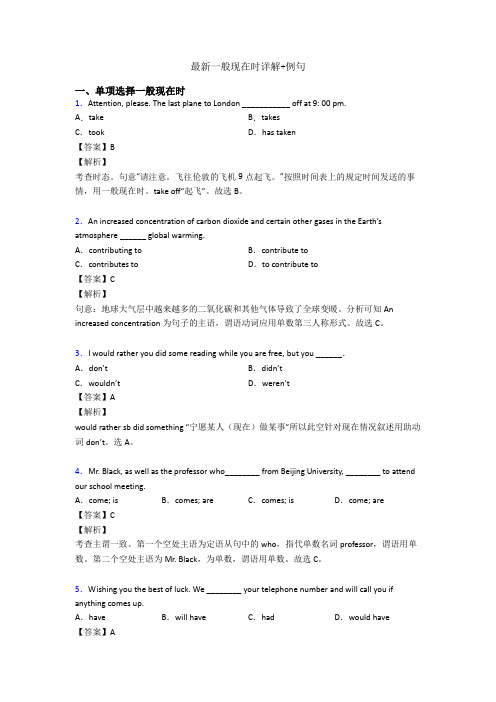
【答案】C
【解析】
句意:地球大气层中越来越多的二氧化碳和其他气体导致了全球变暖。分析可知An increased concentration为句子的主语,谓语动词应用单数第三人称形式。故选C。
3.I would rather you did some reading while you are free, but you ______.
最新一般现在时详解+例句
一、单项选择一般现在时
1.Attention, please. The last plane to London ___________ off at 9: 00 pm.
A.takeB.takes
C.tookD.has taken
【答案】B
【解析】
考查时态。句意“请注意。飞往伦敦的飞机9点起飞。”按照时间表上的规定时间发送的事情,用一般现在时。take off“起飞”。故选B。
A.boughtB.buyC.will buyD.have bought
【答案】B
【解析】
试题分析:句意:每当你买礼物的时候,你最好从接收方的偏好想一想。whenever引导的让步状语从句,采用一般现在时表将来的用法。故选B。
考点:考查动词的时态。
7.Paul could be a very attractive boy but he ______ to his behaviour.
【答案】C
【解析】
【详解】
考查时态语态。句意:上个世纪这座宫殿着火三次,原来的建筑几乎什么也不剩了。本句中动词remain意为“剩余”,没有被动语态,也不能用于进行时态。根据句中时间状语now可知本句应该使用一般现在时的时态,故C项正确。
一般现在时的结构和用法英语

一般现在时的结构和用法英语一般现在时(simple present tense)是英语中最常用的时态之一,表示现在正在进行或经常发生的动作、状态或习惯。
它的结构比较简单,主要由动词原形构成,但根据人称的不同,在第三人称单数时需在动词原形后面加上-s或-es。
以下是一般现在时的结构和用法:结构:肯定句:主语 + 动词原形(加-s或-es)例句:She eats breakfast every morning.否定句:主语 + do not / does not + 动词原形例句:They do not like to exercise.疑问句:Do / Does + 主语 + 动词原形?例句:Do you play the piano?用法:1.表示经常发生的动作或习惯:例句:I usually go jogging in the morning.2.表示普遍真理或自然规律:例句:The sun rises in the east.Water boils at 100 degrees Celsius.3.表示客观事实或常识:例句:The Earth revolves around the sun.The capital of France is Paris.4.表示主观感受或态度:例句:I love traveling.She hates vegetables.5.表示日程安排:例句:The meeting starts at 9 am.The concert ends at 10 pm.6.表示评论或解释:例句:The movie is boring.This book explains difficult concepts clearly.7.表示未来事件(通常与表示时间的副词连用):例句:The movie starts at 7 pm tomorrow.The flight leaves at 9 am on Monday.8.表示祝愿或命令(通常与表示情感的动词连用):例句:May you have a wonderful birthday!Let's go for a walk.需要注意的是,第三人称单数的主语(he, she, it)在动词原形后面要加上-s或-es。
- 1、下载文档前请自行甄别文档内容的完整性,平台不提供额外的编辑、内容补充、找答案等附加服务。
- 2、"仅部分预览"的文档,不可在线预览部分如存在完整性等问题,可反馈申请退款(可完整预览的文档不适用该条件!)。
- 3、如文档侵犯您的权益,请联系客服反馈,我们会尽快为您处理(人工客服工作时间:9:00-18:30)。
9.I would be happier if you did more studying while you are free, but you ___________.
A.don’tB.didn’tC.wouldn’tD.weren’t
【答案】A
【解析】
如果你空闲时多学习学习我会很高兴,但是你不这样做。But为转折连词,前后时态应该一致,would为虚拟语气一般现在时态,所以but后面应为一般现在时。
【答案】D
【解析】
考查情态动词和时态。will表示“不可避免性”。如:Boys will be boys.句中的don’t worry说明了该句用一般现在时。
15.—Have you got any news of the exam results?
—No, but I’ll contact you as soon as Ithem.
21.The classroom ________ by students every day.
A.cleans B.cleaned
C.is cleaned D.is cleaning
【答案】C
【解析】
【详解】
考查时态和被动语态。句意:教室每天都由学生打扫。句子主语The classroom,单数第三人称形式,与谓语动词clean之间是被动关系,再结合every day,可知句子用一般现在时态的被动语态,故选C。
19.We’ll go to play with snow if it ______ tomorrow.
A.snow B.snows
C.will snow D.snowed
【答案】B
【解析】
【详解】
考查if引导的条件状语从句。句意:如果明天下雪,我们就去玩雪。此处是if引导的条件状语从句,主句是一般将来时态,从句用一般现在时态,且主语是it,故答案为B。
11.We have no idea what air we will be breathing in the future if weanything to stop hazy weather.
A.hadn’t done B.didn’t do
C.haven’t done D.don’t do
【答案】D
A.am getting B.got
C.will get D.have got
【答案】D
【解析】考查动词时态。句意:——你有考试结果的消息吗?——没有,但我有了会尽快联系你的。as soon as连接的时间状语从句中,指未发生的动作,主句一般将来时,从句用一般现在时代替一般将来时。此处have got相当于have ,故选D.
22.He will have learned the guitar for eight years by the time he ________ from the university next year.
A.expectedB.expects
C.has expectedD.will expect
【答案】B
【解析】
试题分析:根据语境和时间状语when it is finished and furnished可知该句要用一般现在时,A项为一般过去时,C项为现在完成时,D项为一般将来时,故选B。
考点:考查时态
17.On an average day most of us _____ our smart phones 47 times, and nearly double that if we’re between the ages of 18 and 24.
A.checked B.would check
A.is measured; measuredB.is measured in; measuring
C.measures; measuredD.measures in; measuring
【答案】C
【解析】
【详解】
考查非谓语动词。句意:如果以米测量,我们的房间量起来八米宽。第一空measure为系动词,意为“量起来”;第二空考查非谓语动词,逻辑主语Our bedroom与动词measure为被动关系,故用过去分词作状语。故选C。
13.--Do you know anyone in Paris?
--No,I’ll make friends once.
A.I have settled B.I’ll be settled C.I am settled D.I’m settling
【答案】C
【解析】此题考查时态。句意:——你在巴黎认识人吗?——没有,一旦安顿下来我就会交朋友。此处once引导时间状语从句,once引导的从句不能用将来时,如果谓语动词是将来发生的动作,动词常用一般现在时来代替将来时。故选C。
2.I would rather you did some reading while you are free, but you ______.
A.don’tB.didn’t
C.wouldn’tD.weren’t
【答案】A
【解析】
would rather sb did something “宁愿某人(现在)做某事”所以此空针对现在情况叙述用助动词don’t。选A。
考点:考查时态
8.A long road tests a horse’s strength and a long-term task ________ a man’s heart.
A.provesB.will proveC.is provingD.has proved
【答案】A
【解析】
试题分析:考查动词时态。句意:路遥知马力,日久见人心。这是一条谚语,故用一般现在时态,故选A。
5.We live in a beautiful cottage with a yard, which ______ 20 feet from side to side.
A.measuresB.is measured
C.measuredD.has been measured
【答案】A
【解析】
试题分析:考察非谓语。句意:我们住的地方有一个院子,这个院子从一遍到另一边的距离是20英尺。
3.Wishing you the best of luck. We ________ your telephone number and will call you if anything comes up.
A.haveB.will haveC.hadD.would have
【答案】A
【解析】
试题分析:考查动词的时态。句意:祝你好运。我们有你的电话号码,如果有什么事,我们会打电话给你。我们有你的电话号码是客观事实,故用一般现在时,故选A。
C.will check D.check
【答案】D
【解析】考查动词时态。句意:平时,我们大多数人每天会查看智能手机47次,年龄在18岁至24岁之间的人次数几乎会多出一倍。根据句意可知句子用一般现在时态,故选D。
18.Our bedroom ________ 8 metres across, if ________ in metres.
考点:考查动词的时态。
7.The Dragon Boat Festival ________ the beginning of the hottest season of the year.
A.is markingB.marksC.will markD.marked
【答案】B
【解析】
试题分析:考查时态。一般现在时表示经常性习惯性的行为。本句中使用一般现在时端午节标志着一年中最热的季节的开始。故B正确。
20.If he ________ exercise, he______ healthy.
A.not; will B.isn’t; won’t be
C.doesn’t; will be D.doesn’t do; won’t be
【答案】D
【解析】
【详解】
考查if条件句中的时态。句意:如果他不做运动,他就不会健康。If条件句,如果主句用一般将来时态,则从句用一般现在时态,且句子主语是he,单数第三人称,故选D。
【解析】考查时态。句意为:我们不知道如果我们不采取措施阻止雾霾天气的话,我们未来将呼吸什么样的空气。根据主句的时态和时间状语“in the future”可知,if条件句要用一般现在时表将来。根据句意可知选D。
12.By the time the teacher _______ back, we ________ the thorough cleaning.
一般现在时详解+例句
一、单项选择一般现在时
1.Attention, please. The last plane to London ___________ off at 9: 00 pm.
A.takeB.takes
C.tookD.has taken
【答案】B
【解析】
考查时态。句意“请注意。飞往伦敦的飞机9点起飞。”按照时间表上的规定时间发送的事情,用一般现在时。take off“起飞”。故选B。
A.came, have finishedB.comes, have finished
C.will come, will have comeD.comes, will have finished
【答案】D
【解析】
句意:到老师回来为止,我们将会完成彻底的打扫工作。根据句意可知,老师回来是将来,在时间状语从句中,从句用现在表示将来,主句用将来,此句根据语境要用将来完成时,故选D。
2、指紧接着发生的两个短动作,主从句都用一般过去时
如He took out his English books as soon as he sat down.
